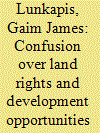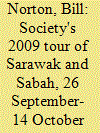| Srl | Item |
| 1 |
ID:
123499


|
|
|
|
|
| Publication |
2013.
|
| Summary/Abstract |
Confusion over land rights issues and opportunities created through communal titles may just be rhetoric to some, but for the poor rural communities, it is a matter of survival. As this paper reveals, this may be due to contradictory interpretations between native communities and state agencies of what constitutes native customary rights. The methods and materials used are based on case studies in the state of Sabah, Malaysia with regard to the policies, programmes and projects that have been implemented in rural areas. This was made possible through interviews with key informants, textual analyses and state documents, and through observations of projects implemented in the rural areas of Sabah. Based on the information gathered, this paper reveals a worrying pattern of state and peoples' interactions over the provision of communal titles and state projects.
|
|
|
|
|
|
|
|
|
|
|
|
|
|
|
|
| 2 |
ID:
190460


|
|
|
|
|
| Summary/Abstract |
After World War II, Japan became a major recipient of foreign aid from the USA. As Japan’s economy improved in the 1960s, it played a significant role as a global aid donor in world politics through its Official Development Assistance (ODA). This commitment continued into the 1990s when Japan, as one of the leading proponents of the concept of human security, began providing humanitarian aid to more countries across the globe. To better understand the notion of human security in international politics, this paper examines Japan’s endorsement of the concept in its foreign policy strategy. This paper provides an overview and critical assessment of Japan’s Grant Assistance for Grass-Roots Human Security Projects (GGP) in the state of Sabah in East Malaysia from 2000 to 2021. This paper argues that different contexts and circumstances in the state of Sabah require further study, especially for understanding Japan’s focus and concern in the area of basic human security needs, as enshrined in the GGP philosophy. Despite Japan’s GGP objective as part of its foreign policy to promote human development, the execution of its foreign aid in Sabah does have issues. This paper concludes that the implementation of Japan’s GGP necessitates greater inclusion, particularly for other vulnerable groups and underdeveloped areas in Sabah. Despite Japan’s GGP objective as part of its foreign policy to promote human development, the execution of its foreign aid in Sabah does have issues. This paper concludes that the implementation of Japan’s GGP necessitates greater inclusion, particularly for other vulnerable groups and underdeveloped areas in Sabah.
|
|
|
|
|
|
|
|
|
|
|
|
|
|
|
|
| 3 |
ID:
094942


|
|
|
|
|
| Publication |
2010.
|
| Summary/Abstract |
The coming to power of the Pakatan Rakyat (PR) opposition coalition in five states following the 2008 election has interrupted the one dominant party political process that has prevailed for more than 50 years, and that facilitated the Barisan Nasional (BN)'s domination of the centre and penetration into the states and local authorities. Nowadays, the PR-led states of Selangor and Penang in particular have challenged federal domination as never before. The old ways of bullying weaker and poorer opposition-led states such as Kelantan and Sabah in the 1990s have been rejected. The new balance of federal-state relations has allowed the BN-led states of Sabah and Sarawak to press for decentralisation of decision-making, increased development allocations, and a greater say in determining local issues. Hence, in spite of the absence of constitutional reforms vis- -vis federal-state relations, some restructuring of those relations is underway. However, the regular occurrences of controversies suggest that Malaysia has still not transited from a centralised federalism to a more co-operative one.
|
|
|
|
|
|
|
|
|
|
|
|
|
|
|
|
| 4 |
ID:
140059


|
|
|
| 5 |
ID:
094114


|
|
|